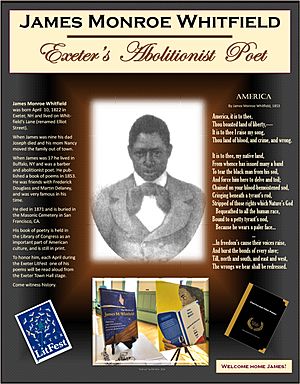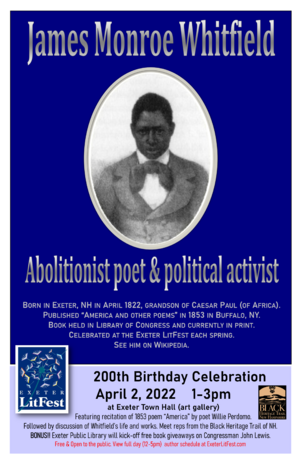James Monroe Whitfield facts for kids
James Monroe Whitfield (born around April 10, 1822 – died April 23, 1871) was an African-American poet, activist, and leader. He was well-known for his writings and efforts against slavery and for African Americans to move to other countries during the time before the Civil War. In 1853, he published a book of poems called America and other Poems.
Contents
James Whitfield's Early Life
James Whitfield was born in Exeter, New Hampshire, around April 10 or 12, 1822. His mother, Nancy (Paul), was from Exeter. His father, Joseph Whitfield, had escaped slavery in Virginia. James's mother's father, Caesar Nero Paul, was enslaved when he was young. He became free in 1771. Through his mother, James was related to important people like Rev. Thomas Paul and Jude Hall, a soldier from the Revolutionary War.
The Whitfield family lived in a small home on Whitfield's Lane. This street was later renamed Elliot Street in 1845. People remembered their home as a "pretty cottage" surrounded by beautiful flowers.
James went to school in Exeter until he was nine. At that age, his father died suddenly. His mother had died when James was seven. So, James and his brothers and sisters moved out of town. By 1839, he was living in Buffalo, New York, and working as a barber. He owned his barber shop and his home. Even with his work, Whitfield found time to write. He was publishing his own papers by the time he was 16.
On July 12, 1843, Whitfield married Frances Lewey in Cuyahoga County, Ohio. They had three sons: James Lewey Jr., Charles Henry, and Walter B.
His great-niece was the famous Boston writer Pauline Elizabeth Hopkins. She wrote about a scene at James's home in Exeter in her 1900 novel, Contending Forces.
His Powerful Poems
In 1853, Whitfield published his book of poems, America and other Poems. He dedicated it to his friend Martin Delany. About half of the poems in the book were about slavery. The other half were about art, nature, or famous people like John Quincy Adams and Joseph Cinque.
Whitfield also had many poems published in important anti-slavery newspapers. These included The Liberator and The North Star. His poems often showed the unfair treatment of African Americans. They also criticized the bad parts of politics and religion.
One of his most famous poems was "America," published in his 1853 book. This poem showed many of Whitfield's ideas. It talked about how America claimed to be free but still had slavery. It also described the hard lives of both free and enslaved Africans in the United States.
Another well-known poem was written in 1867, after the Civil War. It was about the two ships that came to the New World in 1620. One ship brought the first Pilgrims, starting a new nation. The other ship brought the first enslaved Africans, starting slavery in America. This poem was read to a crowd of two thousand people in San Francisco. This was at a celebration for the fourth anniversary of the Emancipation Proclamation.
More than two centuries have passed
Since, holding on their stormy way,
Before the furious wintry blast,
Upon a dark December day,
Two sails, with different intent,
Approached the Western Continent.
One vessel bore as rich a freight
As ever yet has crossed the wave;
The living germs to form a State
That knows no master, owns no slave.
She bore the pilgrims to that strand
Which since is rendered classic soil,
Where all the honors of the land
May reach the hardy sons of toil.
The other bore the baleful seeds
Of future fratricidal strife,
The germ of dark and bloody deeds,
Which prey upon a nation's life.
The trafficker in human souls
Had gathered up and chained his prey,
And stood prepared to call the rolls,
When, anchored in Virginia's Bay—
Fighting for Freedom and New Homes
In 1850, Frederick Douglass visited Whitfield's barber shop. Douglass was very impressed by Whitfield's poems. He called him a "sable son of genius." Douglass also admired Whitfield's strong feelings against slavery.
Whitfield became an important supporter of the Colonization Movement. This movement believed that African Americans should move back to Africa or to parts of South or Central America. Whitfield disagreed with Douglass, who did not support this idea. Instead, Whitfield joined with Martin Delany, who thought Haiti or Central America would be good places.
In 1853, Delany, Whitfield, and others asked for a national meeting. This meeting would discuss the idea of moving. It was held in Cleveland, Ohio, in 1854. A big debate between Douglass and Whitfield was published in newspapers. This helped people understand the different ideas. Whitfield also got involved in a plan by Senator Frank P. Blair. This plan was to create a colony for Black people in Central America. Whitfield might have even traveled to look for land for this project in 1859.
After the Emancipation Proclamation was issued, which declared many enslaved people free, Whitfield stopped focusing on the idea of moving. He then moved to California. He believed that Black people could still succeed there without unfair laws.
Life in California
Around 1861 or 1862, Whitfield moved to San Francisco. Many African Americans in the Northwest thought he was "the" great African-American poet. He owned his home and his barber shop there. Whitfield also joined the Prince Hall Freemasons, a Black fraternal organization. He became a leader for their California Grand Lodge from 1864 to 1869.
James Monroe Whitfield died on April 23, 1871, in San Francisco. He was 49 years old and died of heart disease. He was buried in the Masonic Cemetery, which no longer exists.
His Lasting Legacy
Whitfield's poems are included in a special book called African American Poetry: 250 Years of Struggle & Song. This book is part of the Library of America's collection.
In 2022, a celebration was held in Exeter, New Hampshire, for his 200th birthday. During this event, a national poet named Willie Perdomo read Whitfield's famous poem "America."
One of Whitfield's poems is read every year at the literary festival in Exeter, New Hampshire.
See also
- African-American literature
 | Kyle Baker |
 | Joseph Yoakum |
 | Laura Wheeler Waring |
 | Henry Ossawa Tanner |



